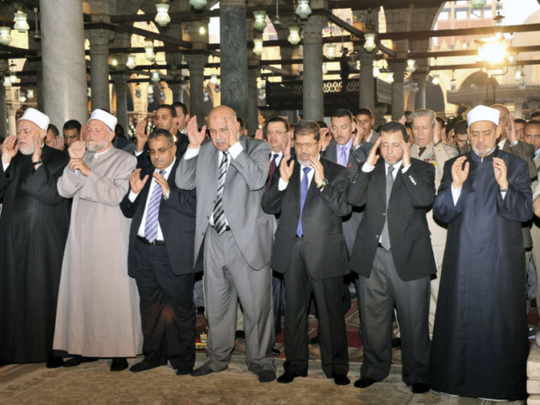
Cairo: Egypt’s Islamist President Mohammad Mursi seems keen to say prayers in large public mosques, reversing a trend of his predecessor Hosni Mubarak who rarely appeared in crowded mosques.
Since taking office in late June as Egypt’s first elected civilian president, Mursi has been seen offering prayers in public mosques near his palace in eastern Cairo or his house on the outskirts of the capital. During the Muslim holy month of Ramadan that ended on Saturday, Mursi, a former senior official in the Muslim Brotherhood, performed the congregational Friday prayers in big mosques in Cairo and other major cities amid complaints from his bodyguards who find it hard to secure him in public places.
Mursi on Sunday performed the prayers of Eid Al Fitr that marks the end of Ramadan in the Omar ibn Al-Aas Mosque in a working-class area in southern Cairo. Thousands of worshippers went to the mosque for the same prayers, as scores of elite presidential bodyguards were deployed inside and in the vicinity of the spacious mosque.
On several occasions, Mursi delivered sermons after the prayers, encouraging Egyptians to work hard and preserve national unity.
“Seeing the president performing prayers in the midst of ordinary people is positive conduct, but if he shuns talking politics,” said Jamal Zahran, a political science professor.
He added that Mursi’s habit of delivering sermons in mosques has turned them into political forums that may foment political discord. “By giving addresses inside mosques, Mursi lends a religious aura to his rule,” he said.
Egyptian authorities long banned politics inside mosques. In the final years of the rule of Mubarak, toppled in February 2011, the government sought to bring all mosques nationwide under its control to undercut influence of opponents like the Muslim Brotherhood in the predominantly Muslim country.
Mubarak, who ruled Egypt for nearly 30 years, used to perform prayers on major Islamic occasions in a high-security mosque in the Red Sea resort town of Sharm Al Shaikh or in army mosques.












